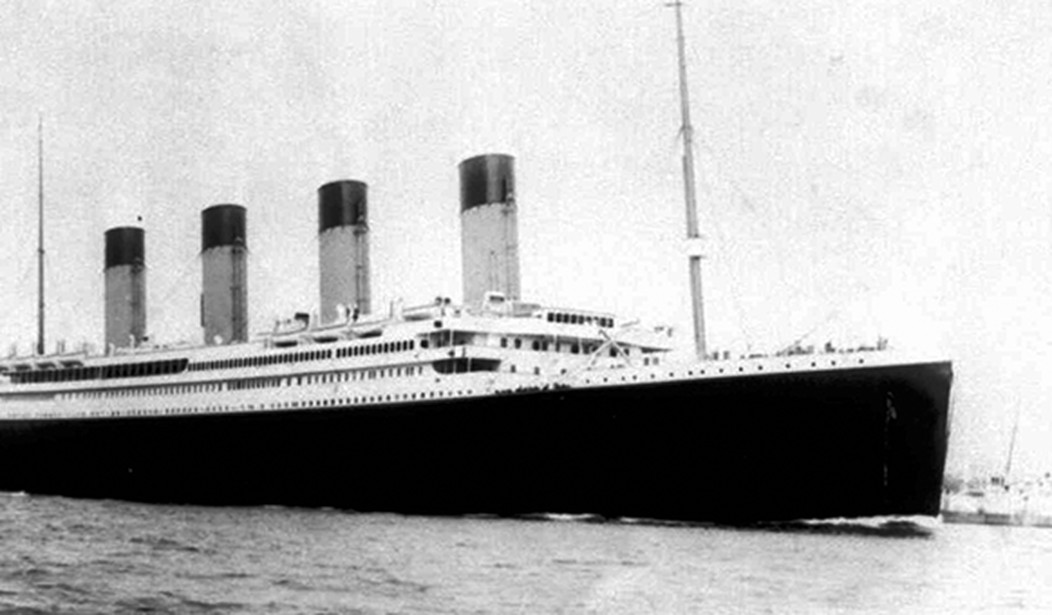The tragic deaths of five individuals who went into a private submarine to visit the gravesite of the R.M.S. Titanic reminds us of the triumph and tragedy of the great ship. Over 111 years since Titanic sank, there are many reasons she speaks to us.
For some, there are oceanographic reasons. Many have been inspired to work at sea, at the surface or in the deep, by the discovery of Titanic. Some visit Titanic for money. What is dangerous for some is exciting for others, but there is no denying the strong interest that Titanic aroused even before its 1912 sinking; an interest that increased dramatically upon the discovery of the ship in 1985 by Dr. Robert Ballard and his team.
Much of the interest in Titanic comes from a bygone era. Never will we see all the elements of the Old World coming together at all at once; a time where Britain was still an Empire, where the Federal Reserve did not exist, before the World Wars, commercial radio, television, and the internet. Titanic was the cultural centerpiece of its brief life.
While the film Titanic is ostensibly an anti-Edwardian Era film, full of class warfare of the rich against the poor woven together through a love story (1958’s A Night To Remember is much better at capturing the event and the stoic British heroism that took place), truthfully the 1997 film would not have achieved its popularity without the amazing details of what even the poorest character, who had nothing to lose and later died in an act of self-sacrifice, called the grandest (i.e. richest) ship in the world. There was nothing like Titanic and likely never will be again.
Recommended
She had it all. There were hundreds of immigrants excited for life in the New World. The Sunday services, led by Captain Smith, singing “For Those In Peril On The Sea.” Nowadays ships seldom have church services, let alone those led by its Captain. The code of “women and children first” is also lost due to lifeboats for all, a good thing, and a lack of chivalry, a bad thing.
Even the dark tales of most lifeboats leaving half full and refusing to row back for their loved ones who were dying or the utter failure of the Californian (neglected in the 1997 film but extensively covered in A Night To Remember) to come to the aid of Titanic evoke questions as does the question if someone was actually shot rushing for the lifeboats.
The founders of Macy’s, Mr. and Mrs. Isidor Strauss who refused to leave the ship without each other; both perishing, evokes heroism as do the wireless operators working nearly to the end, even with the power gone, with water nearing the foot of their cabin. There was the womanizer millionaire in Benjamin Guggenheim who, after assisting in the loading of several lifeboats, put on a tuxedo and said, “We've dressed up in our best and are prepared to go down like gentlemen” and "If anything should happen to me, tell my wife in New York that I've done my best in doing my duty."
The Captain, Chief Officer and First Officer were all lost, along with all the Engineers, who kept the lights of the ship going as long as possible yet resulting in their own untimely deaths. The legend of Captain Smith’s last words “be British” or “every man for himself” remains. The ship’s designer, a gentleman named Thomas Andrews, also died, ostensibly looking at a painting named “Plymouth Harbor” in the First-Class Smoking Lounge after valiantly helping with the lifeboats.
The ship’s Band, while lulling many into a sense of complacency with their ragtime music, also were all lost doing their duty. Meanwhile the controversy remains if the Band played “Nearer My God to Thee” or “Autumn” or both. Regardless, such a unique courage will likely never be seen again, nor will we see the words honoring them such as engraved in the monument at Southampton, UK erected in their memory that proclaims, “They Died At Their Posts Like Men.” If there was any doubt about that sentiment, no less than 30,000-40,000 people lined the streets for Bandmaster Wallace Hartley’s funeral in Colne, Lancanshire. The crew and band did their duty like men and exemplified the highest ideals of the British Empire.
Morgen Robertson’s 1898 book, The Wreck of the Titan, was published 14 years before the sinking of Titanic yet had some amazing coincidences with the real ship to include a similar name and a supposedly unsinkable 800-foot-long ship striking an iceberg and sinking on its maiden voyage in the Atlantic Ocean while not having enough lifeboats for all on board.
Those on the lost submarine, ironically also named Titan, who visited Titanic are now one with her. As Dr. Robert Ballard, who discovered the Titanic wreck in 1985 said, “It’s a whole bunch of things…now down at the bottom of the ocean…it’s a very peaceful place, a very quiet place. It (Titanic) sits up very nobly and at rest.”
*Views in this article are those of the author and not any government agency.

























Join the conversation as a VIP Member